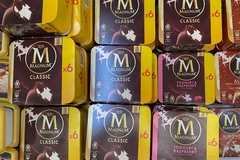
- Industry news
Industry news
- Category news
Category news
- Reports
- Key trends
- Multimedia
- Journal
- Events
- Suppliers
- Home
- Industry news
Industry news
- Category news
Category news
- Reports
- Key trends
- Multimedia
- Events
- Suppliers
Givaudan Tackles Reb-A Bitterness, as Stevia Advances on Market

In addition to basic ingredient research, Givaudan has developed an in-depth sensory understanding of bitterness blocking requirements for a range of high-intensity sweeteners through an expert tasting panel of people sensitive to Reb-A off-notes.

12/02/09 Givaudan, the world’s leading flavours and fragrances company, has identified and applied for patents related to its discovery of the bitter taste receptor triggered by Rebaudioside-A (also known as Reb-A), the new stevia-derived ‘natural high intensity sweetener’ recently pronounced safe by the US FDA. Understanding how bitterness is activated in the mouth with Reb-A has enabled Givaudan to discover and develop flavour ingredients that specifically block this mechanism.
“These are not highly aromatic flavours like vanilla or apple, they are flavouring compounds that are extremely subtle in terms of their taste alteration and their ability to react in the taste receptor part of the mouth”, Mike Size, Global Head of Beverages for Givaudan told FoodIngredientsFirst.com. “By doing this we try to suppress or block the activation of the bitter receptor versus the positive attributes that the sweetener has, which is activating the sweet receptors”, he added.
“It is a toolbox of ingredients that works in different ways, depending on the type of application that it’s in, whether it’s liquid, dry, highly acidic and whether it’s a sweet flavour or more of a tart flavour like the difference between a lemon-lime and an orange which will have a different combination of tastes”, he explained.
Size stressed that what the company is offering is a toolbox, not a flavour. “We do have some very new ingredients that we are bringing to customers, but it’s really not a specific flavouring compound”. Givaudan says it has utilised advances in taste research, sensory science and receptor-guided ingredient discovery to address the bitterness associated with Reb A. Screening of a diverse chemical library has led to a portfolio of more than 20 new, best in class flavour ingredients effective against Reb A bitterness. Over the last two years, Givaudan obtained regulatory approval for six new natural ingredients for intense sweetener taste improvement.
In addition to basic ingredient research, Givaudan has developed an in-depth sensory understanding of bitterness blocking requirements for a range of high-intensity sweeteners through an expert tasting panel of people sensitive to Reb-A off-notes. This is essential to Givaudan’s ongoing testing and proprietary ingredient development programme, the company said. The company has already realized a number of commercial successes with customers for natural masking ingredients, including Reb-A, and has achieved double-digit volume growth across its sweetener enhancement and bitterness masking portfolio.
In December 2008, The United States Food & Drug Administration (FDA) issued a no objection letter with respect to the stevia extract high-purity Rebaudioside A (Reb A). This indicates the FDA has no objection to the conclusion that Reb A at a minimum specification of 95% is Generally Recognised As Safe (GRAS) among qualified experts for use in beverages, foods and tabletop sweeteners. This response from the FDA clears the way for high-purity Reb A, the first all-natural zero calorie sweetener, to be adopted as a key ingredient in mainstream food and beverage production. The news was quickly followed by announcements from both Coca-Cola and Pepsi of imminent product launches using the stevia extract.
Pepsi announced that new zero-calorie SoBe Lifewater is the first enhanced water beverage in the US market to feature PureVia, made from a highly pure extract of the stevia plant leaf. PureVia is the result of innovative technology that isolates 97 percent pure Reb A, which is derived from the sweetest and best tasting part of the stevia leaf. Elsewhere Coca-Cola said that Odwalla, Inc., the nation’s leading health beverage brand, is adding two new reduced-calorie juice drinks to its product portfolio. Sweetened with the right combination of TRUVIA natural sweetener, organic evaporated cane juice and fruit juices, Odwalla Mojito Mambo and Odwalla Pomegranate Strawberry each has 50 calories per 8-oz. serving for consumers who are seeking a natural reduced calorie and reduced sugar beverage. Developed jointly by Cargill and The Coca-Cola Company, TRUVIA natural sweetener is a zero-calorie natural sweetener using rebiana, which comes from the best-tasting part of the stevia leaf. Meanwhile Coca-Cola North America announced the 2008 launch of Sprite Green. The new reduced-calorie Sprite line extension, is the first of what the Company expects will be many new, naturally sweetened, reduced, low and zero-calorie beverages sweetened with TRUVIA natural sweetener in the future. Sprite Green is naturally sweetened with TRUVIA brand sweetener and has 50 calories per 8.5-ounce serving and 5% lemon juice.
Beverages has been the first key approach for stevia thus far, but others will follow, Size believes. “Beverages is obviously one of the areas there’s been a lot of activity around with this new sweetener, particularly in North America, but it’s not exclusive to beverages. People are looking at it in yoghurt and confectionery and chewing gum and we are looking at applying our toolbox in all of those applications”, he explained.
New product activity with stevia is still in its infancy. The Innova Database recorded over 120 launches containing stevia over the 12 months to the end of October 2008, and over 50 of those were in Japan, where product launches were led by savoury snacks and biscuits, with over 30 of the total, although yoghurts, soft drinks, fish products, baby foods and even mayonnaise were also launched using the sweetener.
In terms of labeling, the ingredient toolbox that Givaudan is offering will be labelled as ‘natural flavour’. “In the case of Reb-A especially, because the play with our customers is natural, they want to call it a natural high intense sweetened product, making it different from aspartame or sucralose. They tend to want natural flavour solutions. So optimally what we are offering them is something that is labeled as natural flavour although we can also create artificial flavours if required”, Size explained.
For Size, Reb-A does not pose more challenges than other intense sweeteners. “It’s a question of degree, some people find any given sweetener acceptable, others have some very negative reactions and you would really have to bring the profile back quite a bit before they would find it acceptable. For any intense sweetener that’s out there, there is a bell-curve for those who would find it acceptable and those who need some extensive change before they would like it. Reb-A is no less challenging than some of the artificial high intensity sweeteners.”
He therefore does believe that the ingredient has a strong market potential, because of its natural source. “I would say that from our perspective, this has the potential to be game changing in the market. It’s certainly a need that’s been unmet as a natural high intensity sweetener. We’ve definitely heard from consumers that we’ve heard from that this has been an unmet need for a long time, so the fact that it now exists and has been approved is something that we’re really excited about”, he added.
Elsewhere in the flavours sector, it emerged last month that PureCircle, the world’s leading developer, producer and marketer of high-purity Reb A had signed an exclusive global strategic collaboration with flavour supplier Firmenich, to accelerate the commercialisation of Reb A in the global food and beverage industry. Firmenich has developed innovative flavour systems for Reb A, which will be rolled out across food and beverage applications. Under the terms of the collaboration, Firmenich and PureCircle will combine to offer natural flavour and sweetening solutions to category leaders in the global food and beverage market, PureCircle said.
by Robin Wyers










